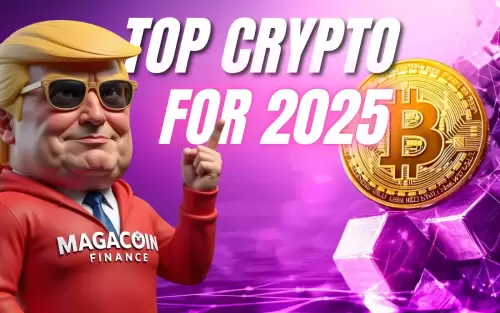 |
|
 |
|
 |
|
 |
|
 |
|
 |
|
 |
|
 |
|
 |
|
 |
|
 |
|
 |
|
 |
|
 |
|
 |
|
Cryptocurrency News Articles
XRP: A Relatively Stable Investment in a Volatile Market
Jan 30, 2025 at 01:01 am
While XRP still faces challenges, such as regulatory hurdles and potential competition from other blockchain projects, its focus on real-world utility, institutional support, and regulatory engagement provides a more stable foundation than many of its cryptocurrency peers.
Despite certain risks, such as ongoing regulatory challenges and stiff competition in the cross-border payments space, XRP is often regarded as a more stable cryptocurrency compared to many others. Several factors contribute to this relative stability, setting it apart from the unpredictable price swings that are characteristic of other digital assets like Bitcoin and Ethereum.
One of the key elements that bolster XRP’s stability is its real-world utility. Ripple, the company behind XRP, designed it to serve as a bridge currency for cross-border transactions. Unlike many cryptocurrencies that primarily cater to speculative traders, XRP is deeply integrated into global payment systems, which gives it a much stronger foundation for price stability.
Ripple's partnerships with major financial institutions and payment providers, including Santander, American Express, and PNC Financial Services, are significant contributors to XRP's institutional backing. This support from well-established entities provides confidence in XRP’s long-term viability, which, in turn, makes it less susceptible to the extreme fluctuations often seen in other digital currencies. The involvement of institutional investors further stabilizes the asset by ensuring a steady demand for XRP for real-world use cases.
XRP’s more structured relationship with regulators also adds a layer of stability. Unlike the more uncertain regulatory environment surrounding other cryptocurrencies, XRP has been proactive in working with global financial regulators. Though Ripple is currently embroiled in a legal dispute with the U.S. Securities and Exchange Commission (SEC) over the classification of XRP as a security, the overall global engagement of Ripple Labs with financial regulators is seen as a positive aspect. This level of regulatory engagement helps clarify XRP’s role in the financial ecosystem and provides some certainty for investors, which is critical for long-term stability.
Furthermore, Ripple's compliance efforts in various countries suggest that XRP will continue to be legally accepted in many regions, further insulating it from sudden shocks that might arise from changing regulations in other parts of the crypto market.
Unlike Bitcoin, which operates on a proof-of-work consensus algorithm and has an open supply model, XRP is pre-mined and has a large portion of its supply held in escrow by Ripple Labs. This controlled supply helps mitigate the risk of hyperinflation or excessive market flooding—an issue that other cryptocurrencies face when mining rewards increase supply too quickly.
Ripple's escrow mechanism ensures that the XRP market isn't flooded with excess tokens, and the gradual release of tokens over time provides predictability and avoids supply shocks. This structure, combined with the fact that Ripple holds a large portion of XRP's total supply, contributes to a less volatile price movement, as there is more control over the token's availability in the market.
Another advantage that contributes to XRP’s stability is its core focus on cross-border payments. As the world becomes more interconnected, the demand for fast, low-cost international money transfers continues to grow. XRP plays a significant role in this sector by providing an efficient alternative to traditional payment methods like SWIFT. Its ability to settle payments quickly, often within seconds, and at a lower cost compared to traditional remittance services makes it a compelling option for financial institutions.
XRP's established role in the payment network and the increasing adoption by institutions helps ensure liquidity, which is crucial for any asset to maintain price stability. A liquid market means that investors can buy and sell XRP with less slippage and less price impact, which helps to smooth out market volatility.
While XRP still faces challenges, such as regulatory hurdles and potential competition from other blockchain projects, its focus on real-world utility, institutional support, and regulatory engagement provides a more stable foundation than many of its cryptocurrency peers. XRP’s controlled supply, coupled with its role in the global cross-border payments system, ensures that it is less prone to the erratic price fluctuations that often affect purely speculative tokens.
In a market as volatile as cryptocurrency, XRP offers a more stable investment option, especially for those seeking exposure to digital assets with practical use cases and long-term growth potential. Although no cryptocurrency is completely risk-free, XRP’s unique characteristics make it a solid choice for investors looking for stability in an otherwise unpredictable market.
Disclaimer:info@kdj.com
The information provided is not trading advice. kdj.com does not assume any responsibility for any investments made based on the information provided in this article. Cryptocurrencies are highly volatile and it is highly recommended that you invest with caution after thorough research!
If you believe that the content used on this website infringes your copyright, please contact us immediately (info@kdj.com) and we will delete it promptly.






























































